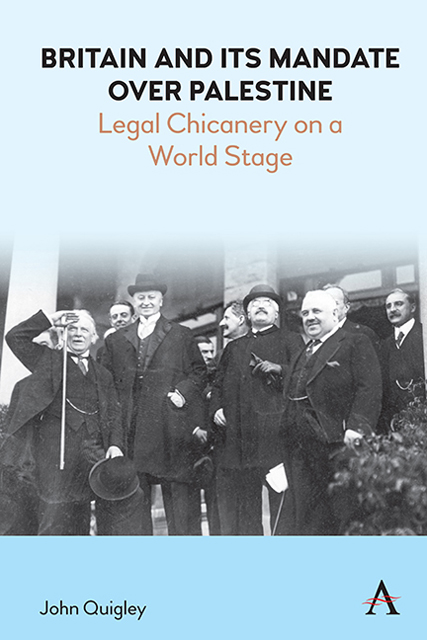Book contents
- Frontmatter
- Contents
- Preface
- Setting the Stage: Was Britain’s Rule in Palestine Legal?
- 1 The Balfour Declaration Is the Focal Point for the Legal Situation of Palestine
- 2 The Balfour Declaration Was a Binding Commitment to the Jewish People
- 3 The Jewish National Home Meant a Jewish State
- 4 The Balfour Declaration Was Issued to Affirm Jewish Rights in Palestine
- 5 The Paris Peace Conference Raised Jewish Statehood to the International Level
- 6 Britain’s Allies Made the Balfour Declaration an International Commitment
- 7 Britain’s Allies Endorsed Jewish Rights
- 8 Britain Took on Palestine Because of the League’s Mandate System
- 9 The League of Nations Protected Palestine’s Arab Population
- 10 Britain Was Given Palestine by the League of Nations
- 11 The League of Nations Put the Palestine Mandate into Legal Force
- 12 The Peace Treaty with Turkey Legalized Britain’s Status in Palestine
- 13 The Palestine Mandate Document Was a Treaty between Britain and the League
- 14 The League of Nations Required Britain to Implement the Balfour Declaration
- 15 The Palestine Mandate Document Implemented the League Covenant
- 16 The Palestine Mandate Document Recognized Jews as a National Group
- 17 The Palestine Mandate Document Bound Britain to the Balfour Declaration
- 18 The International Community Committed Itself to the Balfour Declaration
- 19 Britain Held Legal Status in Palestine
- 20 The United Nations Charter Carried Forward a Jewish Entitlement to Statehood
- Postscript: Why History Matters
- Documents Annex
- Notes
- Bibliography
- Index
17 - The Palestine Mandate Document Bound Britain to the Balfour Declaration
Published online by Cambridge University Press: 10 January 2023
- Frontmatter
- Contents
- Preface
- Setting the Stage: Was Britain’s Rule in Palestine Legal?
- 1 The Balfour Declaration Is the Focal Point for the Legal Situation of Palestine
- 2 The Balfour Declaration Was a Binding Commitment to the Jewish People
- 3 The Jewish National Home Meant a Jewish State
- 4 The Balfour Declaration Was Issued to Affirm Jewish Rights in Palestine
- 5 The Paris Peace Conference Raised Jewish Statehood to the International Level
- 6 Britain’s Allies Made the Balfour Declaration an International Commitment
- 7 Britain’s Allies Endorsed Jewish Rights
- 8 Britain Took on Palestine Because of the League’s Mandate System
- 9 The League of Nations Protected Palestine’s Arab Population
- 10 Britain Was Given Palestine by the League of Nations
- 11 The League of Nations Put the Palestine Mandate into Legal Force
- 12 The Peace Treaty with Turkey Legalized Britain’s Status in Palestine
- 13 The Palestine Mandate Document Was a Treaty between Britain and the League
- 14 The League of Nations Required Britain to Implement the Balfour Declaration
- 15 The Palestine Mandate Document Implemented the League Covenant
- 16 The Palestine Mandate Document Recognized Jews as a National Group
- 17 The Palestine Mandate Document Bound Britain to the Balfour Declaration
- 18 The International Community Committed Itself to the Balfour Declaration
- 19 Britain Held Legal Status in Palestine
- 20 The United Nations Charter Carried Forward a Jewish Entitlement to Statehood
- Postscript: Why History Matters
- Documents Annex
- Notes
- Bibliography
- Index
Summary
Moshe Sharett, as we saw, called the Palestine mandate document “an open covenant” and “an international instrument.” Whatever other implications Sharett intended, he certainly meant that the document would be binding on Britain, and specifically, that Britain would be bound to implement the Balfour Declaration. Yoram Dinstein said, to show that Britain intended to be bound, that the Balfour Declaration was “formally acknowledged and reiterated by successive British governments.” One feature of the Narrative is that the mandate document required Britain to implement a Jewish national home. There could clearly not be any Jewish rights at the international level if the mandate document was not at least binding on Britain.
No sooner had Britain declared mandate rule in 1920, however, than it began to have second thoughts about the feasibility of implementing the Balfour Declaration. Arab opposition in Palestine to the Zionist project forced a reevaluation. Britain faced a population intent on immediate independence. In May 1921, Arabs staged major protests in Jaffa, Palestine's largest city, as they feared that Britain was helping the Zionist Commission, renamed by then as the Palestine Zionist Executive, to take over their country. In a plea to Britain to cancel the Balfour Declaration, the Palestine Arab Congress complained that the British Government “is already carrying out this declaration into effect in spite of our wishes.” A commission of enquiry was appointed, and its recitation of Arab grievances mirrored those of the 1920 military court of inquiry we saw in Chapter 8.
Minutes from 1921 meetings of the British Cabinet reveal concern that the Palestine situation might spin out of control:
The Cabinet were informed that recent reports from Palestine were of a disturbing character. Arabs and Jews were armed, or were arming, and a conflict might shortly ensue, particularly if the Moslem Christian Delegation, now in London, returned without having secured the withdrawal of Mr Balfour's pledge to the Zionists. The latter were naturally anxious as to their position, and wished to be reassured as to the Government's support.
Canceling the Balfour Declaration and ceding power to an Arab-led government was considered:
Two courses were open to the Cabinet.
- Type
- Chapter
- Information
- Britain and its Mandate over PalestineLegal Chicanery on a World Stage, pp. 127 - 132Publisher: Anthem PressPrint publication year: 2022

